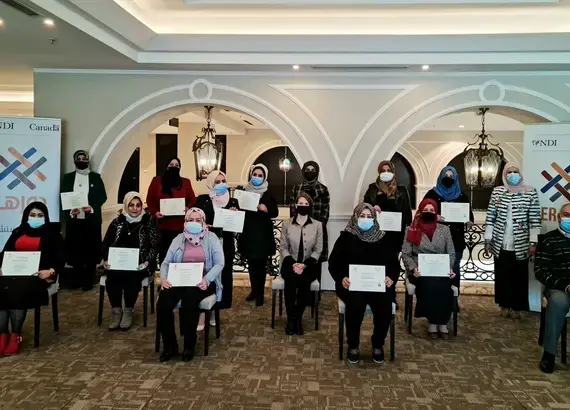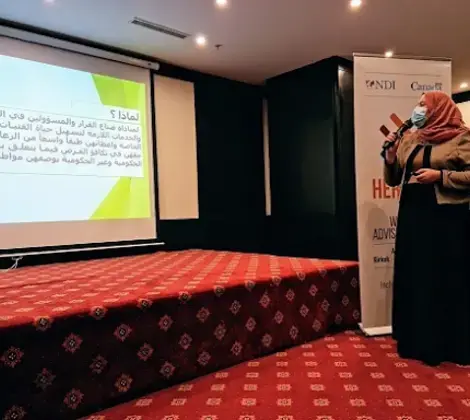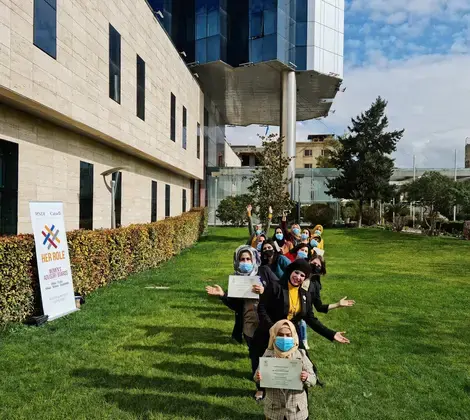
Success Story
Women's Advisory Boards in Iraq Address Problems Worsened by the COVID-19 Pandemic
With the rapid spread of the Coronavirus across Iraq, the need for gender-focused policy recommendations has become critical now more than ever. Public opinion research conducted by the National Democratic Institute in October 2020 highlighted that, in addition to the deterioration of the country’s health and economic sectors, Iraqi women are concerned about the backsliding of gender equality in their provinces. Lockdown measures have cornered women into playing traditional household roles, regressing previously established gender equality initiatives. Girls’ access to education has been particularly hindered by the shift to online learning due to traditional values that prevent young women from appearing on camera.
To address these concerns, review past achievements, and plan for the year ahead, more than 60 Women’s Advisory Board (WAB) members — from the provinces of Anbar, Diyala, Kirkuk, Ninewa and Salahaddin — took turns gathering in Erbil, in accordance with social distancing guidelines, to hold their first in-person workshops since the start of the pandemic last year.

One of the main challenges families have faced is understanding how to use Iraq’s online education system. In addition to the lack of resources and government assistance, parents are also facing pressures from the new learning environment. To guide parents through the new world of online education, Salahaddin’s WAB provided online training to parents on the use of the educational platform designed by the government. WABs guided parents through the use of key platforms such as Zoom and Newton, which are commonly used in the new online education system.
Other local initiatives, such as those from Diyala and Kirkuk, undertook efforts to improve greenspace in their communities. The Anbar WAB provided female students access to a laboratory where they could improve technical skills and also helped women with disabilities find employment. The WAB from Ninewa focused on providing psychological and health support to imprisoned women and their children.
“With the local initiatives, we achieved tangible results,” said a WAB member from Ninewa. “This contributed to giving us more credibility and confidence.” The WAB members, through discussing and exchanging information on their local initiatives, enhanced their understanding of community needs and the importance behind gaining trust from local government officials.
In addition to addressing their recent local initiatives, WAB members progressively worked on their Policy Development Project (PDP), with the objective of analyzing public policy issues in their community from a gender-focused lens and to develop and present gender-sensitive policy recommendations to relevant authorities.
Due to the dramatic effect that COVID-19 has had on the already deteriorating education sector in Iraq, WABs emphasized the need to focus on addressing the issue of access to education in their provinces.
While the Iraqi Provisional Constitution ensures gender equality and the rights to education, to vote, and to run for office, hurdles like COVID-19 and societal norms have led to the regression of gender equality. When students around the world shifted to online classes, young Iraqi girls’ ability to participate was hindered by lack of access to the internet and subjection to traditional values.
“In the undeveloped communities, parents always look for the opportunity to take girls out of school,” highlighted a respondent in one of NDI’s focus groups. “I think a crisis like this has accelerated that.”
Lack of participation such as not being able to use their cameras has led to an increase in dropout rates. The economic situation also is a key player in the worsening dropout rates. Many families can not afford the costly devices required for online education, leading to girls not only falling behind, but to fall out of the system completely. WABs from Diyala and Kirkuk aim to address this dramatic school dropout rates among children and teenagers.

WABs presented their preliminary research findings and undertook a stakeholder mapping exercise as a starting point for their policy advocacy work. “I learned the details of the different steps of the PDP,” said a WAB member from the province of Salahaddin. “The exchanges with other provinces were really useful. We learned about the challenges the other WABs faced and how they overcame them.” In the coming months, WABs will return to Erbil to participate in a policy formulation workshop that will lead to the drafting of their Policy Brief.
“My perception of women as humans grew dramatically,” said a WAB member from Anbar. “When we worked on gender issues, I experienced and saw how women perceive themselves. Some women look down on themselves. This is in the context of professional education but also in the other walks of life. Many women are convinced that gender inequalities are normal. This can be changed. As a woman, there is nothing that hinders me from achieving my objectives as men do.”
As WAB members planned for 2021, they identified priorities, including members’ capacity building, development of stronger relations with key stakeholders and decision makers, outreach to the most marginalized populations, increasing collaboration with other organizations, and possible cross-province local initiatives.
“I’m glad I had the chance to work with ladies from different provinces. Project Managers faced great challenges, especially during the pandemic; it was really challenging to manage time, meet [online] during the evening, and communicate [due to the poor quality of the Internet].” said a partner organization representative from Diyala. “I’m honored to be working on this project as the head of a local NGO. It really empowered me and I really hope we can continue together.”
This program is implemented with funding from the Government of Canada.



